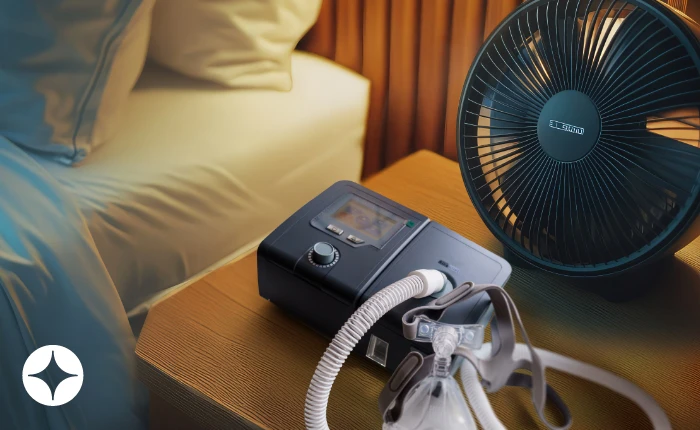
Maintaining a comfortable sleep environment with a consistent temperature is essential for a good night's sleep. Summer heat waves often negatively impact sleep, leading to tossing and turning, and waking up feeling groggy and unrested. Even more concerning is that increased temperatures can also make sleep apnea1 worse. This article explores why heat worsens obstructive sleep apnea and what readers can do to improve their sleep quality while sticking to their treatment plan.
The Reasons Rising Summer Temperatures Make Sleep Apnea Worse
Sleep apnea is a condition that causes stops and starts in breathing during sleep. It usually happens when throat muscles relax too much, causing the soft palate to collapse or the tongue to block the airway. Untreated sleep apnea increases the risk of developing serious health problems2, including cardiovascular disease and Type 2 diabetes.
High temperatures and humidity during the summer months often make breathing more difficult, especially for those with health concerns including sleep apnea. Normally, the body's core temperature drops during sleep, but when the ambient temperature3 increases, the body, particularly the lungs and heart, has to work harder to maintain a consistent, normal temperature. This is why a hot sleeping environment makes it harder to fall asleep and stay asleep.
Temperature-related obstructive sleep apnea is a major concern. We've seen an increase in cases of sleep apnea since 2000 by an estimated 50 to 100%4, and data predicts this trend will continue. One study shows that a hot bedroom can increase the chances of experiencing sleep apnea on a given night by up to 45%5.
Tips to Combat Worsening OSA Caused by Heat
Stop summer heat from exacerbating sleep apnea by taking steps to create a comfortable bedroom environment. These sleep hygiene tips can make a huge positive impact on sleep quality.
- Lower the temperature in the bedroom by opening the windows or by using an air conditioner or fan. The ideal bedroom temperature to optimize sleep is between 60 and 67 degrees6. Use a humidifier if the AC dries out the air too much and causes irritation.
- Stay hydrated7 by increasing water intake during periods of high heat.
- Anyone with sleep apnea should try sleeping on their side to help keep their airway open.
- Choose a mattress made from breathable materials8 that pull heat away from the body.
- Use cooling sheets and pillows. Natural fibers like linen and cotton are good options. Cooling gel pillows are another great choice.
Most importantly, people with sleep apnea should prioritize CPAP compliance9. Improvement of symptoms requires consistent use. Anyone who experiences discomfort with their mask or device should speak with their doctor. A medical professional can ensure the mask fits properly and give recommendations to alleviate other discomforts10, from dry mouth to feelings of claustrophobia. No matter how high temperatures climb this summer, maintaining a routine of CPAP use and keeping the bedroom cool and comfortable will improve sleep quality.
References
- Mayo Clinic – Obstructive sleep apnea
- Johns Hopkins Medicine – The Dangers of Uncontrolled Sleep Apnea
- National Library of Medicine – Ambient Temperature and Obstructive Sleep Apnea: Effects on Sleep, Sleep Apnea, and Morning Alertness
- American Journal of Respiratory and Critical Care Medicine – Rising Temperatures Are Associated With Increased Burden of Obstructive Sleep Apnea
- American Thoracic Society – Climate Change Increases Severity of Obstructive Sleep Apnea
- Cleveland Clinic Health Essentials – What's the Best Temperature for Sleep?
- Indiana University Health – The importance of staying hydrated in the summer heat
- National Library of Medicine – How do sleepwear and bedding fibre types affect sleep quality: A systematic review
- Sleep Apnea.org – CPAP Compliance
- Harvard Health Publishing – I can't tolerate CPAP, what can I do?




